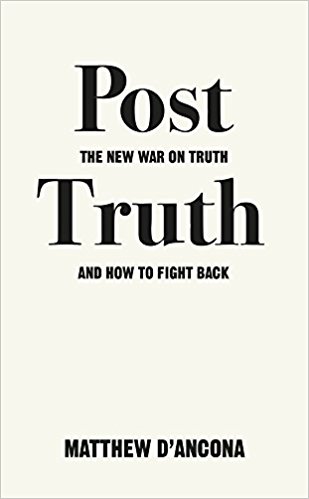 Please buy the book here. Guardian review.
Please buy the book here. Guardian review.
“In practice,” Evan Davis writes in Post-Truth, “we evidently are quite happy to believe untruths.” Davis is stating what is, perhaps, the most indisputable fact regarding what has been trumpeted as the rise of a new kind of “post-truth” politics. Shrewdly, he describes the belief that we a living in a post-truth era as “an expression of frustration and anguish from a liberal class discombobulated by the political disruptions of 2016”. “Post-truth” politics is like “populism” in implying that these unexpected shifts occurred because reason had been subverted. Duped by demagogues deploying new information technologies, voters disregarded argument and evidence in favour of manipulated emotion and fake news. The idea of truth was lost in a morass of relativism, and the politicians who controlled government for decades were abruptly dislodged from power.
Matthew d’Ancona is highly specific as to the date we entered a post-truth era: “2016 was the year that definitively launched the era of ‘Post-Truth’.” There has been “a crash in the value of truth, comparable to the collapse of a currency or a stock”. It’s not that politicians lie more than they did in the past. “Political lies, spin and falsehood are emphatically not the same as Post-Truth. What is new is not the mendacity of politicians but the public’s response to it. Lying is regarded as the norm, even in democracies.”
The view that we create our own realities is, of course, the core of relativism. D’Ancona believes the ground was prepared for a post-truth age when postmodern philosophers propagated a way of thinking in which the gap between the real and the imaginary disappeared, abandoning “the central value of the Enlightenment” – the affirmation that truth is independent of opinion, and supremely worth pursuing.
D’Ancona’s punchy polemic asks questions that are urgently topical and undeniably important. He is right that the internet and social media have transformed communication, giving disinformation and deception in markets and politics added potency. Davis considers how this has happened, and in a rich and probing analysis of the use and misuse of the media suggests the answer can be found in the economics of information. What seems like an irrational message may contain information of a subtle and tacit kind to which people respond. Even when what is being communicated has little or no cognitive content, there are rational explanations as to why such messages can be so effective. Distinguishing between post-truth, post-fact, nonsense and gibberish, Evans’s ambition seems to be to develop a general theory of bullshit.
One of the implications of his analysis is that bullshit can be found across the political spectrum. He devotes remarkably little attention to the fact, but liberals engage in bullshit as much as populists. While leave campaigners may have exaggerated Britain’s financial contribution to the EU, as he shows at length, remainers launched “Project Fear” – a naked appeal to the emotions deploying unverifiable figures about the economic consequences of leaving the EU that were plucked from the air. Few voters can have imagined they were making their decision on the basis of brute facts. In the event counter-productive, Project Fear was an example of incompetent bullshit – a larger category of discourse than Davis seems to think. Most voters made their decision on the basis of what was most important to them – in other words, they were guided by their values.
Political movements use all the resources they can command to achieve their goals, including new technologies, and no one who knows anything about Putin’s Russia can doubt that it will use any means at its disposal to subvert democratic politics. But this does not mean the historic shifts of the last year were engineered by cyber-leaks or psychometric profiling. Whatever Trump’s relations with Russia may be, it was decades of neglect in the American rustbelt that stirred many voters in these crucial states to vote for Trump or stay at home. Emmanuel Macron’s victory occurred despite attempts to hack the French election. Contrary to those who think “peak populism” has come and gone, the despair of large numbers who are economically marginalised will continue to fuel extremism in Europe. Brexit is different from these electoral revolts in a number of ways, but it wasn’t a digital conspiracy that produced a Leave landslide in Sunderland.
Yes Edinburgh West has a website, Facebook, Twitter, National Yes Registry and a Library of topics on Scottish Politics, including Media & Broadcasting.
